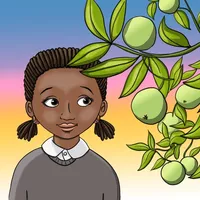和 植物 聊天 的 卡莱
Chatten mit Pflanzen in Calais
Khalai talks to plants
Calle charlando con las plantas
Carlisle qui discute avec les plantes.
Chiacchiere con le piante a Calais
植物とおしゃべりをするカレ
Carlisle, die met planten praat.
Calle conversando com plantas
Карлайл, который общается с растениями.
Carlisle, som talar med växter.
和 植物 聊天 的 卡莱
这 是 卡莱 。
This is Khalai.
Esta es Calle.
カルです。
她 今年 七 岁 。
She is seven years old.
Ella tiene siete años.
彼女は7歳です。
在 肯尼亚 当地 方言 里 , 这 个 名字 是 “ 美好 事物 ” 的 意思 。
In the local Kenyan dialect, the name means "good things".
En el dialecto local de Kenia, el nombre significa "cosas hermosas".
地元のケニアの方言で、名前は「美しいもの」を意味します。
No dialeto queniano local, o nome significa "coisas bonitas".
卡莱 早上 醒来 , 跟 橙子树 说 : “ 橙子树 啊 橙子树 , 快点 长大 吧 , 给 我们 结 好多 又 大 又 甜 的 橙子 !”
Carley woke up in the morning and said to the orange tree, "O orange tree, orange tree, grow up quickly, and give us a lot of big, sweet oranges!
Calle se despertó por la mañana y le dijo al naranjo: "¡Naranjo, naranjo, crece rápido y danos muchas naranjas grandes y dulces!
Calle si svegliò al mattino e disse all'arancio: "Arancio, arancio, cresci in fretta e dacci tante arance grandi e dolci!
カルレは朝起きて、オレンジの木に言った:「オレンジの木、オレンジの木、早く大きくなって、大きくて甘いオレンジをたくさん実らせて!
Calle acordou de manhã e disse à laranjeira: "Laranjeira, laranjeira, cresça rápido e nos dê muitas laranjas grandes e doces!
在 卡莱 走路 去 上学 的 路 上 , 她 对 草地 说 : “ 草地 啊 草地 , 你 一定 要 长 得 绿油油 的 , 别 干枯 了 。”
On the way Kalai was walking to school, she said to the grass, "Grass, grass, you must grow green and don't dry up.
En el camino Calle camino a la escuela, le dijo al pasto: "El pasto, el pasto, debes estar verde y no seco.
Mentre Carlisle camminava verso la scuola, disse al prato: "Prato, prato, devi crescere verde e non seccare.
カライが学校に行く途中、彼女は草に向かって、「草、草、あなたは緑に育ち、枯れないようにしなければならない。
No caminho para a escola, Calle disse para a grama: "A grama, a grama, você deve ser verde e não seca.
卡莱 路过 了 野花 , 她 对 野花 说 : “ 野花 啊 野花 , 你们 尽情 地 开放 吧 , 这样 我 可以 把 你们 夹 在 我 的 头发 里 。”
Kalai passed by the wildflowers, and she said to the wildflowers, "Wildflowers, wild flowers, bloom as much as you want, so I can put you in my hair.
Calle pasó junto a las flores silvestres, y a las flores silvestres les dijo: "Flores silvestres, flores silvestres, ábrete todo lo que quieras, para que te pueda poner en mi pelo.
Carlisle passò accanto ai fiori di campo e disse loro: "Fiori di campo, fiori di campo, apritevi quanto volete in modo che possa appendervi ai miei capelli.
カライは野の花のそばを通り過ぎ、野の花に「野の花、野の花、好きなだけ咲いてくれるから、私の髪にあなたを入れてもいいわ。
Calle passou pelas flores silvestres e disse às flores silvestres: "Flores silvestres, flores silvestres, abram o quanto quiserem, para que eu possa colocá-las em meu cabelo.
在 学校 , 卡莱 对 操场 中间 的 树 说 : “ 小 树 啊 小 树 , 快点 长出 枝叶 吧 , 这样 我们 就 可以 在 树荫 里 读书 了 。”
At school, Carle said to the tree in the middle of the playground: "Little tree, little tree, let's grow branches and leaves so we can read in the shade.
En la escuela, Calle le dijo al arbolito en medio del patio: “Arbolito, arbolito, vamos a hacer ramas y hojas, para poder leer a la sombra.
卡莱 还 对 学校 附近 的 灌木丛 说 : “ 灌木 啊 灌木 , 你们 一定 要 长 得 壮壮 的 , 这样 坏人 就 进不了 学校 了 。”
Carley also said to the bushes near the school: "Shrubs, bushes, you must grow strong so that bad guys can't get into the school.
Calle también les dijo a los arbustos cercanos a la escuela: “Arbustos, arbustos, deben crecer fuertes, para que la gente mala no entre a la escuela.
Carlisle disse anche ai cespugli vicino alla scuola: "Cespuglio, cespuglio, devi crescere forte in modo che i cattivi non possano entrare nella scuola.
カーリーはまた、学校の近くの茂みに向かって、「低木、茂み、悪者が学校に侵入できないように、強くなる必要があります.
当 卡莱 从 学校 回到 家 里 , 她 又 去 看 了 看 橙子 树 , 问 它 : “ 你 结 橙子 了 吗 ?”
When Carle got home from school, she looked at the orange tree again and asked it, "Have you had any oranges yet?
Cuando Calle llegó a casa de la escuela, volvió a mirar el naranjo y le preguntó: "¿Ya tienes naranjas?
Quando Calleigh tornò a casa da scuola, tornò dall'arancio e gli chiese: "Hai prodotto delle arance?
カールが学校から帰ってきたとき、彼女は再びオレンジの木を見て、「オレンジはもう食べましたか?」と尋ねました。
Quando Calle voltou da escola, ela olhou para a laranjeira novamente e perguntou: "Você já tem laranjas?
卡莱 叹 了 一 口 气 : “ 橙子 还 是 绿色 的 , 我 明天 再 来 看看 你 吧 !
Carle sighed: "The orange is still green, I'll see you tomorrow!
Calle suspiró: "La naranja todavía está verde, ¡vendré a verte mañana!
カールはため息をついた:「オレンジはまだ緑だ、また明日ね!
Calle suspirou: "A laranja ainda está verde, venho te ver amanhã!
或许 到 了 明天 你 就 会 给 我 一 只 又 大 又 甜 的 橙子 了 。”
Maybe tomorrow you'll give me a big, sweet orange.
Quizás mañana me des una naranja grande y dulce.
Forse domani mi darai un'arancia grande e dolce".

